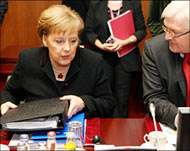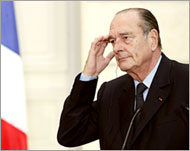EU leaders locked in budget standoff
European Union leaders are locked in a standoff over the bloc’s future financing as Britain clashed with France on farm spending and the poorer EU nations pleaded for generosity from their rich partners.

The start of the summit’s second day on Friday was delayed to allow for urgent bilateral negotiations that were quickly overshadowed by a plea from three poorer nations – Estonia, Latvia and Lithuania – for the EU to open its wallets wide for them.
On the second day of a two-day summit, European leaders were scrambling to secure a budget deal for 2007-2013.
Agreement on a budget would shore up much-needed confidence in EU unity, while failure to clinch a deal could undermine its credibility.
If the EU cannot decide on a budget, spending will be frozen at 2006 levels, providing for no new aid for the EU’s new members or for emergency humanitarian aid projects.
Tony Blair, the British prime minister and the summit’s chairman, was holding on to his nation’s 20-year-old annual EU budget rebate and was seeking a “meaningful” review of farm spending, a British diplomat said.
French position
Jacques Chirac, the French president – whose country is the biggest recipient of EU agricultural subsidies – dug in his heels, saying he would resist such a farm spending review unless Britain lets go of the rebate.
 |
|
Chancellor Merkel says Germany’s |
Meanwhile, the 10 nations that joined the EU last year pressed for more aid in Blair’s proposed budget.
Prime Minister Blair’s current proposal of euro847 billion ($1.02 trillion) for 2007-2013 represents 1.03% of the bloc’s gross national income. Polish Prime Minister Kazimierz Marcinkiewicz said he would ask for a bigger budget, and suggested 1.05% of GNI.
“We want structural (aid) funds to be high enough to actually guarantee the possibility of the development of new members,” Marcinkiewicz said, adding that France and Germany also were pushing for more spending.
Calling for equality
The leaders of Estonia, Latvia and Lithuania issued a declaration saying future EU spending must be based on “solidarity, equity and fairness”.They said a deal must not come at the expense of countries still paying the price of decades of Soviet economic mismanagement.
But British officials said there was little wiggle room, despite “some progress” in negotiations so far. Blair, whose country holds the rotating EU presidency, has demanded both austerity and a review of farm spending, which eats up 43% of the EU’s annual outlays.
 |
|
President Chirac is resisting |
Blair began the day by meeting separately with Chirac and the leaders of Germany, Spain, Austria and Hungary. He then saw President Chirac and Angela Merkel, the German chancellor, together.
“The summit can only succeed if there is an agreement on the (spending) review clause,” said a German diplomat who asked not to be named because of the sensitivity of the negotiations.
British rebate
France focussed on the British rebate – a legacy of former British prime minister Margaret Thatcher’s legendary EU budget battles that has great political significance in Britain.
“First the rebate, then the review clause” on farm spending, a French source said. Blair’s official spokesman told reporters Britain was seeking “more rational” EU spending that is less focussed on agriculture, a sector that accounts for a tiny portion of Europe’s economic output.
At her debut EU summit, Chancellor Merkel sounded dubious about chances for success. “I cannot say if we’ll reach a deal. The talks are very, very difficult,” she said, telling reporters that as the EU’s “biggest net payer (Germany) must fight for its interests. We must be frugal”.
|
Blair planned to present a new spending plan on Friday afternoon but indicated that if he saw no chance of a deal, he may not present another proposal. Many leaders questioned his ability to produce a draft budget that will win broad support given his refusal to slash Britain’s rebate.
“There has to be a basis for agreement; otherwise, there is no point in putting forward the proposal,” Blair told reporters late on Thursday.